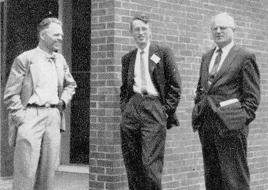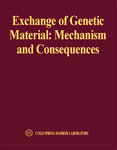|
XXIII: Exchange of Genetic Material: Mechanisms and Consequences 1958 |
|
|

|
From left: Dr. E.R. Dempster, Dr. G. Lefevre, Dr. M. Demerec SYMPOSIUM SYNOPSIS LIST OF PARTICIPANTS CONTENTS OF SYMPOSIUM VOLUME PHOTOGRAPHS PUBLISHED VOLUME  |
Exchange of Genetic Material: Mechanisms and Consequences
3–11 June, 1958
Symposium Synopsis
Organizer: M. Demerec
Advisors: E. W. Caspari, J .Schultz and B. Wallace
The 1958 Symposium included talks describing not only genetic recombination in bacteria, phage, and fungi and multicellular organisms (Drosophila, maize), but also mechanisms of DNA replication and how they might impact chromosome inheritance and recombination.
One of the most influential presentations at this Symposium was a study by Matt Meselson and Franklin Stahl. In the annals of biochemical genetics research, their 1958 density transfer experiment must rank among the top in terms of the simplicity of its design, the clarity of its predictions, and (hence) the authority with which it established the semi-conservative model for chromosomal DNA replication. Indeed, John Cairns called it "the most beautiful experiment in biology" and it continues to influence how we view what constitutes a great experiment.
A great deal of debate at this Symposium centered on whether recombinants (particularly in bacterial and phage systems) are largely produced by "copy choice" replication (Lederberg, 1955) of two or more parental DNAs or by breakage and reunion of fully replicated chromosomes. Various contributors entered judgements of "yes," "no," "perhaps," and "sometimes" regarding whether recombination occurs via a copy choice mechanism. Based on his observations, Al Hershey mischievously offered, "If one wishes to conclude that the mechanism of recombination is unknown, one must add that at least three mechanisms are unknown" and that the popularity of the copy choice mechanism is because it "...is easier to think about than the notion of breakage and reunion of finished chromosomes."
Demerec had asked F.M. Burnet to discuss connections between recombination phenomena and epidemiology. At the close of his Symposium contribution (which described recombination and virulence among influenza virus serotypes), Burnet says, "I have not previously been to one of the Symposia but...I have tried to provide something in the Cold Spring Harbor tradition, which I interpret as allowing a little light-hearted speculation but having no inhibitions at all about puncturing trial balloons".
Search images: